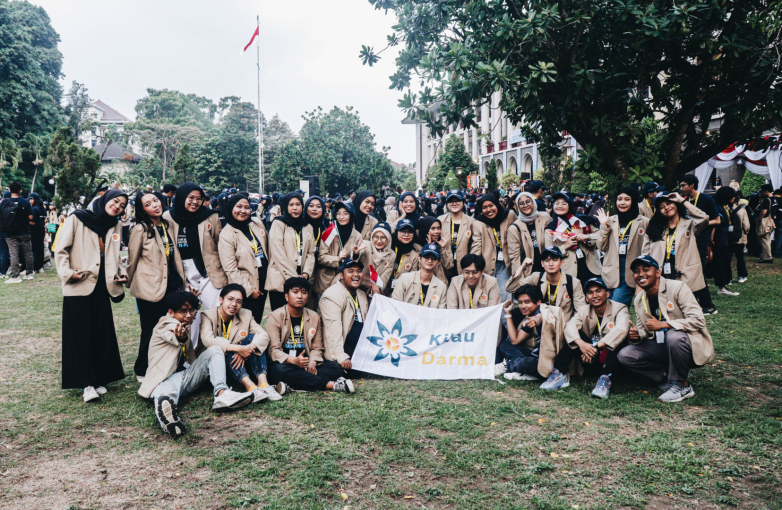
Adelia Magda Firdausi, or Magda as she is affectionately known, is a student of the Agricultural Extension and Communication Study Program (PKP), class of 2021, at the Faculty of Agriculture, Universitas Gadjah Mada. Together with her KKN team, Magda spent 50 days in Darma Village, Darma District, Kuningan Regency, West Java. Under the theme “Village Potential Development and Community Empowerment,” they sought to make a positive impact on the community through various carefully designed programs.
In Darma Village, the KKN team focused on several key programs, such as assisting the community in sorting organic and inorganic waste and utilizing it for agriculture and aquaculture. Additionally, they were involved in the rehabilitation of Darma Reservoir by utilizing the abundant water hyacinth around the reservoir. The goal of these programs was to maximize the potential of the village while adding value to the local residents.
One of the most memorable moments for Magda was participating in a torch parade to celebrate the night of Satu Suro (the Javanese New Year). It was the first time for her and several team members to experience a torch parade, where they walked around the residential area to Darma Reservoir carrying bamboo torches. Despite the light rain, the atmosphere that night felt warm and full of camaraderie.
However, this KKN experience was not without challenges. Living with nine people from different backgrounds and habits in one house, in a place they had never visited before, posed a unique test for the team. The differences in weather, water, and food in Kuningan required some team members to make extra adaptations, but with solidarity, they managed to overcome all the challenges.
The programs implemented by the KKN team had a significant impact on the community of Darma Village. They aimed to enhance social interactions, introduce new technologies and innovations, and participate in various community activities such as Posyandu (maternal and child health services) and Bina Keluarga Remaja (youth family development). The enthusiasm and participation of the community were very high, with many hoping that these programs would continue in the future.
During the KKN implementation, the team also collaborated with various local parties, such as the village government, BUMDES (village-owned enterprises), PKK (family welfare movement), the local health center, and MTS (Islamic junior high school). This collaboration allowed the programs to run more effectively and have a greater impact.
For Magda, this KKN experience offered many valuable lessons. Besides developing professional skills, the experience also brought back fond memories of her family’s hometown in Kuningan. The friendly community and host family who treated them like their own grandchildren made the experience feel like a holiday at grandma’s house with cousins.
Throughout the KKN activities, Magda’s team also realized the importance of their contributions to achieving several Sustainable Development Goals (SDGs). The waste sorting and water hyacinth utilization programs they carried out aligned with SDG 12: Responsible Consumption and Production, which encourages more efficient and sustainable use of resources. Additionally, the collaboration with various parties in Darma Village to improve welfare and empower the community was closely related to SDG 11: Sustainable Cities and Communities, which aims to create inclusive, safe, resilient, and sustainable communities. Equally important, the introduction of innovations in agriculture and aquaculture supported SDG 9: Industry, Innovation, and Infrastructure, which promotes the development of resilient and innovative infrastructure.
Author: Adhika Hafizh Prasada, S.P.
Admin of the Website for the Department of Agricultural Socio-Economics, Faculty of Agriculture, UGM
